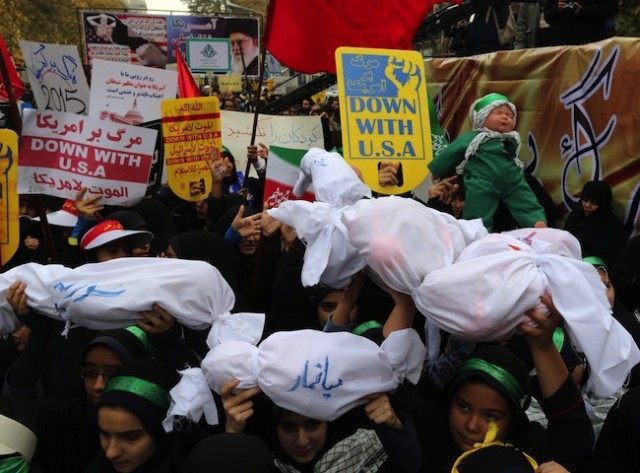On November 4, 1979, Muslim student revolutionaries in the Islamic Republic of Iran took over the U.S. Embassy in Tehran and with it claimed 52 American citizens as hostages in what became a 444-day ordeal that would go on to grip America and the world.
Today, the scars of that not-so-distant memory can still be felt in the hearts and minds of many throughout the United States as new lesions are being created.
Iran has just added two more U.S. citizens to their list of captives, is en route to starting a nuclear arms race in the Middle East, and has upped support for its terrorist proxies in the region. This evolving geopolitical scenario is fueling a narrative the first Supreme Leader, Ruhollah Khomeini, penned 36 years ago and which has become the driving force behind the Islamic Republic’s current leaders in their mission to outsource revolution and undermine the West.
Every year, since that fateful day, Iranians have been celebrating the occasion by holding rallies on the day they recognize as the “National Day Against the Global Arrogance.”
On the anniversary of the hostage crisis, Iran’s President Rouhani said the November 4 U.S. Embassy takeover formed the pillars of Iran’s independence and its fight against “arrogant power” and “authoritarianism.” According to Iran’s Mehr news agency, he made the comments while addressing Iran’s Supreme Council of the Cultural Revolution. Rouhani continued: “The message of the Iranian nation today is that they will protect the Revolution’s achievements with perseverance and consistency, national awareness and the guidance of the [Supreme] Leader,” Ayatollah Khamanei.
Iranians flooded the streets of Iran, as has become a tradition on this day, holding rallies throughout several cities to celebrate the incident as effigies of President Barack Obama burned and crowds chanted anti-American slogans. The government has shut down schools to celebrate this national holiday. This time, however, the common chants of “Death to America” and “Death to Israel” were accompanied by “Death to Saudi Arabia,” Iran’s Sunni nemesis.
In an interview with NBC’s Ali Arouzi, a hardliner Iranian woman said she would set fire to a new U.S Embassy with all the Americans inside of it, if diplomatic ties were ever restored between America and Iran.
Meanwhile, just ahead of the anniversary of the hostage crisis, Khamenei addressed thousands of students, telling them that the “Death to America” slogan is not aimed at the American people but American policies:
Know that Iranian nation’s “Down with US” slogan is rational and has strong background and it is clear it does not mean death to the American “nation;” this slogan means death to American policies, death to Arrogance; this has a rational background and our Constitution and logic pronounce the same and it is understandable for any nation.
Khamenei also made a reference to the protagonist in the classic Harriet Beecher Stowe novel Uncle Tom’s Cabin, whose name has become a derogatory term to describe a black person who helps white people oppress other members of his race by acting subserviently. “The US is the same old Uncle Tom,” Khamenei said, seemingly making a veiled reference to President Barack Obama.
Cosmetically, Iran has been on an upward trajectory with the installation of new highways and infrastructures, compared to the deep regression it suffered when Shah Mohammad Reza Pahlavi was overthrown, destroying much of the nation’s beautiful European and Western architecture. Following the Shah’s fall, Iran was thrust into a stone-age era where hardliner Islamists rid its people of freedoms. Prior to the revolution, Iranians had enjoyed a variety of social and economic freedoms, though they lacked the freedom of political expression, a problem the revolution was meant to address and rectify.
After the revolution, not only were Iranians more politically oppressed, they were also stripped of their other freedoms in the process. Many Iranians like America and what it stands for, even when they distrust its leaders.
Many also do not believe Iran is in a good position right now. In fact, the masses believe Iran is worse off than it has been since 1979. The recent Joint Comprehensive Plan of Action (JCPOA), or Iran nuclear deal, is regarded by many who are desperate to “get back at zero again” within the country as helping to rectify that, although the situation there still looks dire.
Mistrust between the Iranian regime and the American government has only amplified this as the number of U.S. hostages being held in Iran grows, hinting at a Cold War-style prisoner swap in the near future. Iranian-American Washington Post journalist Jason Rezaian, former U.S. Marine Amir Hekmati, pastor Saeed Abedini, businessman Siamak Namazi (who is the son of a politician from the Shah’s era), and political analyst Nizar Ahmad Zakka are all languishing in Iranian prisons. Robert Levinson’s whereabouts are still unknown.
The tension becomes even thicker when considering the number of Iranian entrepreneurs in the upper echelons of society who are banking on soon-to-be open paths of commerce between Iran and the West, while hardliners continue to prevent any sort of western influence there.
Hardliners are fearful that the recent JCPOA could become a vehicle to open the floodgates of foreign, specifically Western, influences in their tightly-controlled society. One example is how, just one day after a KFC-like restaurant opened in Tehran, the chain was ordered closed by the Iranian regime. According to Iran’s Tasnim News agency, the manger of the Halal KFC summed it up to a “misunderstanding,” explaining to police that the chain is from Turkey, and disassociated it with the American brand, saying, “it belongs to Muslims and its target market is Muslim nations.”
Follow Adelle Nazarian on Twitter @AdelleNaz and on Facebook.

COMMENTS
Please let us know if you're having issues with commenting.